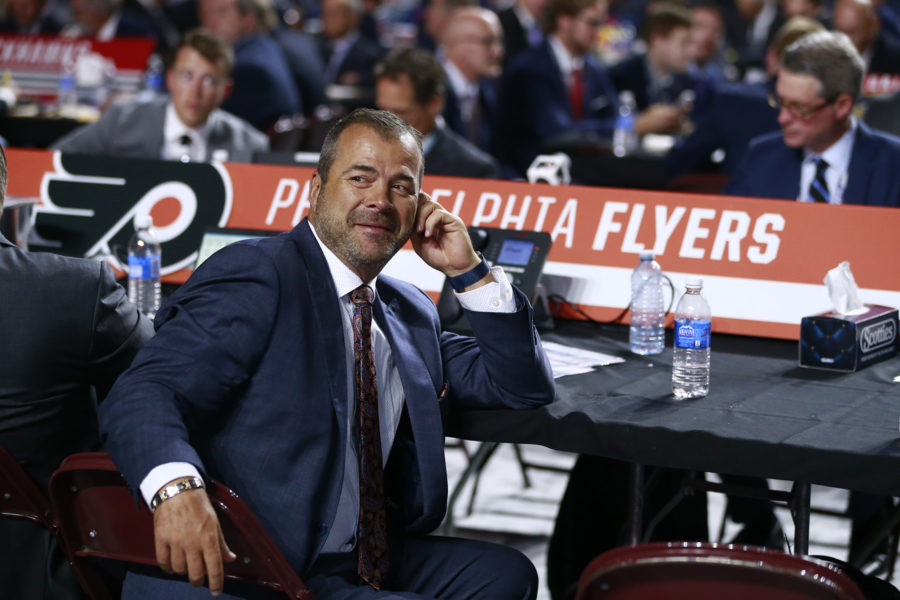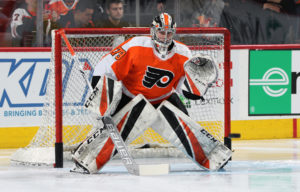
VANCOUVER, BRITISH COLUMBIA - JUNE 21: Head coach Alain Vigneault fo the Philadelphia Flyers looks on from the team draft table during the first round of the 2019 NHL Draft at Rogers Arena on June 21, 2019 in Vancouver, Canada. (Photo by Jeff Vinnick/NHLI via Getty Images)
The Flyers look stronger than last season, but that doesn’t guarantee a playoff spot.
The Flyers, thanks to a handful of off-season moves, look stronger than the team that missed the playoffs last season and finished with just a 37-37-8 record.
But are they strong enough to make a run at their first Stanley Cup since 1975?
That is highly doubtful. In fact, new coach Alain Vigneault will have a challenge trying to steer the Flyers into the playoffs in the talented Eastern Conference.
That said, there are a couple of ways to look at the 2019-20 Flyers:
Glass half-full: Vigneault is a proven winner, and by acquiring Matt Niskanen and Justin Braun, a pair of veteran righthanded defensemen, the Flyers solidified their back end. Their defense, which finished 29th out of 31 teams by allowing 3.41 goals per game last season, should be much improved.
Having promising young goalie Carter Hart from the start of the season should also help. Ditto the addition of 6-foot-5, 216-pound Kevin Hayes, a solid two-way player and their No. 2 center.
Glass half-empty: The Flyers didn’t add a much-needed sniper, and Niskanen and Braun are coming off sub-par seasons and may be on the decline. Having dealt hard-nosed Radko Gudas in the Niskanen trade with Washington, there are also questions about whether the Flyers will have enough physicality in their lineup.
Chuck Fletcher, who is in his first full season as the Flyers’ general manager, prefers looking at the positive side, and it starts with Vigneault, who is the 12th-winningest coach in NHL history with 648 victories. He owns a terrific .588 points percentage.
“What impressed me about AV is his experience,” Fletcher said before training camp started. “He has a long track record of success in this league. He’s been able to go to teams and make them better quickly and keep them at a high level for a long period of time and that’s hard to do. He’s a guy who knows how to win, and I like what he’s done with his staff.”
Vigneault, who has had previous head-coaching stints with Montreal, Vancouver and the New York Rangers, retained goalie coach Kim Dillabaugh and Ian Laperriere, though the latter assistant no longer will coach the penalty kill. Laperriere will be the “eye in the sky” coach from the press box and will also handle the pre-scouting for upcoming opponents.
Vigneault added two former head coaches as assistants: Mike Yeo and Michel Therrein. Yeo will coach the penalty kill, which was 26th in the league last season, while Therrein will direct the power play (22nd), and the Flyers need to make vast improvements in both areas.
After sitting in on some coaching meetings during the summer, Fletcher said he felt “very good about the preparation the coaches have put into the coming season and I’m excited about the collaboration and the communication. AV, even though he’s experienced and has been around the game for a few years, he’s very progressive.”
Vigneault “loves to play an attacking style, and we want to pressure, we want to play fast,” Fletcher said. “But in order to do that, you need to have good structure and you need to have good systems and you need to defend well. That’s the key. You always need to defend. The other team is going to have the puck and try to create and they’re going to get to your zone, and the whole key is how quickly you can get the puck back. I think his teams have always played fast, have always been hard to play against, and have always been teams that have controlled the play. I think the foundation of a good attacking team is a strong defensive structure.”
Hiring Vigneault also helped the Flyers lure Hayes, who signed a seven-year, $50-million deal. Hayes spent four years playing for Vigneault with the Rangers.
“I had a great relationship with AV,” said Hayes, who had a combined 19 goals and a career-high 55 points with the Rangers and Winnipeg last season. “Obviously as a player, you want to play the most minutes and you want to play in every situation. But when you enter the league, you have to prove yourself, and I thought every year with AV, I got more and more ice time and more and more situational play. We had a fine relationship, to be honest, off the ice and on the ice.”
Vigneault “definitely factored into my decision to come here,” Hayes said. “It’s not always easy going to a new locker room, meeting everyone and trying to figure out the new coach. For me, I played for him for four years so it won’t be hard to get acclimated.”
Hayes called Vigneault an “old-school coach who will do anything to win. He’s going to play the best guys that are going that night. He treats everyone the same, whether you’re a vet or a rookie. He lets you know when you’re playing well, and he lets you know when you’re not playing well. He’s a very open-minded coach.”
Vigneault will have much more balance in his top three lines than last year’s coaches, Dave Hakstol and his replacement, Scott Gordon. The Flyers averaged 2.94 goals per game a year ago, finishing 18th in the 31-team NHL.
The Flyers’ top line will feature Sean Couturier (33 goals, 76 points) and Claude Giroux (22 goals, 85 points) and could include Travis Konecny (24 goals).
Hayes and Jake Voracek (20 goals, 66 points) should highlight the second line, which might have James van Riemsdyk (27 goals) or Oskar Lindblom at left wing at various times.
The addition of Hayes drops Nolan Patrick down to the third-line center spot and, on paper, should give him better matchups. If the Flyers are going to be a playoff team, they need Patrick, who had 13 goals in each of his first two seasons, to blossom.
They also need Lindblom, who had 17 goals during an impressive rookie season in 2018-19, to keep growing as a player.
Perhaps most importantly, they need defensemen Ivan Provorov (seven goals, minus-16 rating) and Shayne Gostisbehere (nine goals, minus-20 rating) to rebound from disappointing seasons.
Niskanen, who is in his 13th NHL season, entered camp as the favorite to play alongside Provorov. Maybe he can stabilize Provorov’s game. Braun, in his 10th season, also lends experience to the back end.
“We added some really good key veterans that I think we needed,” forward Scott Laughton said.
Niskanen is excited to be part of a defensive unit that has a nice blend of youth and experience. He especially likes Provorov’s potential.
“He has high-end skill. I like the way he moves the puck, and he’s a strong player and a strong skater,” Niskanen said. “He has a big shot and good instincts, and those kind of guys are fun to play with. It would be an honor to play with him.”
If the Flyers are to improve on their sixth-place Metropolitan Division finish, they need to get off to much better starts to games. Last season, they faced a 2-0 deficit in a staggering 32 of 82 games (39 percent). They won just four of those 32 games.
“It’s tough to play that way, and part of it comes down to depth and the overall talent level of your team,” Fletcher said of the slow starts. “For me, training camp is extremely important any year, but in particular this season. We have to change, and AV is going to come in and set a high standard in camp for our team, and he’s going to hold our players accountable. … We need to develop consistency in everything, in our systems play, in our habits, in our details in the game and our work ethic.
“Generally speaking, if you work at doing things the right way day after day, then you develop those good habits that allow you to have success when the game starts,” Fletcher added. “It all comes down to structure and habits and details and just playing the right way. If we do, not only will we be better defensively, but we’ll have the puck more often and we’ll be able to dictate the play instead of chasing games and reacting to what the other team is doing all the time.”
The Flyers hope a new coaching staff and the addition of three veterans (Hayes, Niskanen, and Braun) will help them play with more focus at the start of games—and that they will keep that focus for 60 minutes.
Having Hart (2.83 GAA, .917 save percentage) for a full season also gives the Flyers reason for optimism. Brian Elliott (2.96, .907) will also see time in the nets. The Flyers set a dubious NHL record by using eight goalies last season, but Hart was a stabilizer after being recalled from the AHL Phantoms.
“He made a huge impact on our group last year,” Laughton said. “We were struggling a bit before he came up and he kind of steadied us and gave us really good goaltending and gave us consistency. He’s such a mature kid and I’m really excited [to see him develop].”
The quicker Hart develops, the quicker the Flyers will take a step toward ending a Stanley Cup drought that has reached 44 years.

PHILADELPHIA, PA – DECEMBER 18: Carter Hart #79 of the Philadelphia Flyers faces a shot during warmups prior to his game against the Detroit Red Wings on December 18, 2018 at the Wells Fargo Center in Philadelphia, Pennsylvania. Tonight is Hart’s NHL debut. (Photo by Len Redkoles/NHLI via Getty Images)

